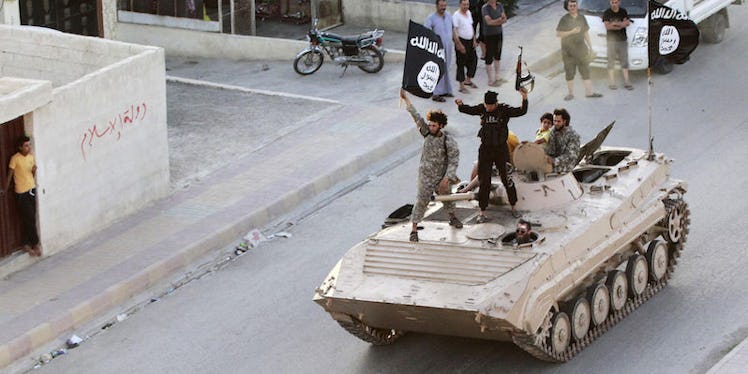
ISIS Is Getting Most Of Its Western Fighters From This Caribbean Island
When people think of the Caribbean, they likely envision picturesque beaches and tropical drinks with tiny umbrellas.
Terrorism is probably the last thing that comes to mind.
But a small country in the Caribbean — Trinidad and Tobago (T&T) — has somehow become a significant foothold for ISIS.
ISIS is struggling right now, but it's still managing to recruit from a tiny island in the Caribbean.
One of the big headlines surrounding ISIS at the moment is the fact the US has killed an estimated 50,000 of its fighters of the past two years.
The terrorist organization is rapidly losing territory in the Middle East and is close to losing Mosul — its last major stronghold in Iraq.
But it's putting up a fierce and brutal fight as it gets increasingly desperate.
ISIS has lost about 45 percent of its territory in Syria and 20 percent in Iraq since its rapid rise to power in 2014.
Given all this, ISIS has also struggled to recruit in recent months.
These are relatively well-known facts to anyone who's been following this topic over the past few months.
But what's likely unknown by many is the fact Trinidad has the highest rate of ISIS recruitment in the Western hemisphere.
According to a recent paper in the journal Studies in Conflict and Terrorism, between 89 and 125 Trinidadians have joined ISIS.
Roodal Moonilal, an opposition Member of Parliament in T&T, claims the number is closer to 400.
But as Simon Cottee, a senior lecturer in criminology at the University of Kent put it for The Atlantic,
Even the figure of 125 would easily place Trinidad, with a population of 1.3 million, including 104,000 Muslims, top of the list of Western countries with the highest rates of foreign-fighter radicalization; it's by far the largest recruitment hub in the Western Hemisphere, about a four and a half hour flight from the U.S. capital.
To understand why this is, you need to be familiar with the history of T&T.
Back in 1990, a group of a group of black Muslims called the Jamaat al Muslimeen attempted to overthrow T&T's government. They stormed parliament in the capital city of Port of Spain, shooting the prime minister (he survived) and taking members of his cabinet hostage.
A separate group of Muslimeen also took over the state-run television station.
This attempted coup ultimately failed.
Due to this incident, Trinidad and Tobago is the only country in the Western hemisphere that has experienced an Islamic insurrection.
There is virtually no punishment for Trinidadians who join ISIS.
Interestingly enough, the Jamaat al Muslimeen is not considered "militant enough" by ISIS.
This largely comes down to the fact the "Islamic scene on the island is divided," according to Cottee.
The radical Sunni Wahhabi-Salafi ideology, which extremist groups like al Qaeda and ISIS adhere to, has recently gained momentum in Trinidad.
According to what Daurius Figueira, a Trinidadian criminologist, told Cottee, Saudis have spent money to spread this ideology on the island.
Figueira said,
If you have any understanding of the Jamaat al Muslimeen, you'll understand that [ISIS] will have nothing to do with them because the Muslimeen does not pass the test by [ISIS] to be a Salafi jihadi organization.
In other words, the Islamic militants who attempted to overthrow T&T aren't hardcore enough for ISIS.
It seems that after its failed coup attempt, Jamaat al Muslimeen evolved into more of a criminal enterprise than an Islamic extremist organization.
But they still seemed to help create a climate in which ISIS has been able to recruit.
Still, it's not clear exactly how ISIS is recruiting in Trinidad.
Some claim it's simply a matter of recruiters in Syria communicating with the small community of Muslims on the island and asking if they want to come to the Middle East and join up.
Cottee claims, however, that a source within the country's Ministry of National Security believes "one particular imam" in Trinidad is playing a key role in recruiting.
This source also claimed some of the recruits even received military training in Trinidad before they headed off to Syria.
Another factor that seems to contribute to the high number of ISIS recruits coming out of Trinidad is the fact the government is doing nothing to stop them from leaving or returning.
As Roodal Moonilal explained to Cottee,
ISIS is not proscribed in T&T, meaning that you can go and train with ISIS for 2-3 years and come back here with all the rights and privileges of a citizen of T&T.
With no risk of punishment, combined with the fact T&T is plagued by high crime rates, among other problems, it's somewhat more understandable why some Trinidadians are joining ISIS.
What's happening in T&T is a terrifying example of ISIS's global reach.
In spite of the fact the group is struggling to maintain a hold over the territory it seized in Iraq and Syria, it's continuing spread its message across the world.